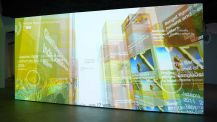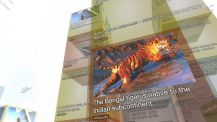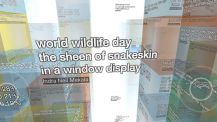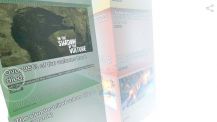Mobile App as Interface for Net-Based Installations
The India Edition complements MORE AND LESS. A new UN study of global population trends predicts that in 2020 India will replace China to become the world’s most populous country. In such scenario people would require more space and other amenities for their survival and this would certainly leave a massive impact on animals’ natural habitat too. Human’s encroachment to their natural surroundings would compel them to duck out of their own settlements. Unfortunately, several species are already extinct and many of them are endangered. The latest data will leave us flabbergasted that every year animals of various species perish almost in a great number. A number of animals disappear unnoticed in remote areas. During our research residency in Kolkata, the Sundarbans and New Delhi, we took a closer look at specific aspects of the threatened diversity. The result is the India Edition of the App MORE AND LESS. The India Edition consists of poems, figures on language diversity and statements on tigers, vultures and bees. MORE AND LESS tries to bring Media Art, Poetry, factual concepts of Population Development and Animal Extinction all together in the form of a unique interdisciplinary project – and continues to expand and elevate them.
Concept: Markus Kirchhofer and Marc Lee, developed during their research residency in India in 2020.
Poems
The English haiku anthology is a state-of-the-art collaboration with the versatile poet Rishikesh Kumar Singh. We met him in New Delhi several times. He is the Founder-President and Director of the Ecosophical Foundation for the Study of Literature and Environment (EFSLE). The EFSLE launched a poetry competition (in the form of haiku anthology) on Indian Species in Danger of Extinction, Ethnic Minorities in India, Urbanization and Population Growth. The participants in the competition came from Bangladesh, India and Sri Lanka. The jury Kala Ramesh (poet and editor, India) selected 21 poems by 13 authors out of 65 entries.
1st Prize Winner: Priya Narayanan (India) 2nd Prize Winner: Rashmi VeSa (India) 3rd Prize Winner: Indra Neil Mekala (India).
Including the above three winning haiku total 21 haiku are selected for the proposed anthology. Here is the complete list of the haijin:
- Priya Narayanan
- Rashmi VeSa
- Indra Neil Mekala
- Sanjuktaa Asopa
- Lakshmi Iyer
- Srinivasa Rao Sambangi
- Sanjay Kumar Sanan
- Ajaya Mahala
- Neha R. Krishna
- P. Rajakumar Sivan
- Minal Sarosh
- Kashinath Karmakar
- Priya Parthasarathy
Figures on language diversity
The diversity of the Indian population is reflected through its linguistic diversity.
Indian languages are recorded in different writing systems such as Devanagari, the Bengali script or the Arabic script. The official national language Hindi is growing disproportionately, while others are threatened with extinction.
Tigers
The Bengal tiger is the national animal of India. “In the past, evidence showed that humans and Bengal tigers cannot co-exist,” Wikipedia says. During our stay in the mangrove forests of the Ganges Delta this was obvious: High fences and deep water channels separate the tigers in their reserves and the people in their villages.
Vultures
In Delhi we met the artist and environmental activist Ravi Agarwal. He drew our attention to the dramatic decline of the vulture population in India and the manifold relationships between humans and vultures. From his publication “In The Shadow Of The Vulture – An Extinction Of Memory” we have taken statements for our India Edition.
Bees
In India there is a great variety of (honey) bee species, from the Black dwarf honey bee (Apis andreniformis) to the Himalayan giant honey bee (Apis laboriosa). Statements such as “A third of everything we eat would not exist without bees” from the documentary “More Than Honey” by the Swiss Markus Imhoof show how important bees are for humans – worldwide.
Supported by
Pro Helvetia, New Delhi
Ecosophical Foundation for the Study of Literature and Environment (EFSLE), New Delhi.
English Haiku Anthology: Remarks of Rishikesh Kumar Singh
We are happy to announce the result of the haiku contest as well as to release the final selected haiku for our upcoming English Haiku Anthology. EFSLE has initiated this project to launch an anthology of English haiku for the participants from India and the SAARC Nations in the form of a three-dimensional digital Book which is entirely a new concept and a very good amalgamation of an art form and the technology. Haiku could be read as moving objects in 360° angles in the app, MORE AND LESS – flying through a three-dimensional Book, that has been conceptualised and designed by Marc Lee and Markus Kirchhofer from Switzerland. The Judge, Kala Ramesh, a veteran haijin, has selected 21 haiku out of 65. We have received haiku from India, Bangladesh and Sri Lanka. The inclusion of the SAARC Nations was an idea of our judge Kala Ramesh to foster this beautiful art form in the entire SAARC world. The Project Coordinator, Rishikesh Kumar Singh, Founder-President and Director of EFSLE, has been pulling out all the stops to promote and elevate this art form. The proposed e-Book will be released by end of June 2020. It’s a proud moment for EFSLE to launch the world’s first 3D e-Book of haiku. This haiku contest proved to be a challenging one as it restricted the poets to write for certain themes such as Urbanization, Indian Species in Danger of Extinction, Ethnic Minorities in India, Globalisation and Digitalisation and Population Growth. According to our judge, this was unique as specific topics like these rarely occur in haiku! However, we have received entries under each theme. Here we present the three winners of the haiku contest with the remarks of the judge- Kala Ramesh. Further the rest of winners’ names are also enlisted.
The 1st prize (Rs: 15,000) goes to
powdered pangolin scales
the smell
of a dead warrior
Priya Narayanan
Kala: To be honest I had to Google pangolin scales, but once I was armed with all this knowledge, each line and each word seemed to talk volumes. Let’s take the first line
powdered pangolin scales
Pangolin scales, like rhino horn, have no proven medicinal value, yet they are used in traditional Chinese medicine to help with ailments ranging from lactation difficulties to arthritis to cancer. The scales are dried and powdered and then made into pills. Though pangolins are protected by an international ban on their trade, they suffer from illegal poaching and trafficking. The figures are staggering.
Now we come to the winning Ls 2 & 3:
the smell
of a dead warrior
Though many think of pangolins as reptiles, they are actually mammals. They are the only mammals wholly covered in scales, which they use to protect themselves from predators in the wild. If under threat, a pangolin immediately curls into a tight ball and uses its sharp-scaled tails to defend itself. While well-equipped to defend against natural predators, they are easily caught by poachers, who simply pick up the animals when they roll into a ball.
I was reminded of this beautiful poem by D. H. Lawrence
Mountain Lion
So, she will never leap up that way again,
with the yellow flash of a mountain lion’s long shoot!
And her bright striped frost-face will never watch any more,
out of the shadow of the cave in the blood-orange rock,
Above the trees of the Lobo dark valley-mouth!
And I think in this empty world there was room for me and a mountain lion.
And I think in the world beyond, how easily we might spare a million or two humans
And never miss them.
Yet what a gap in the world, the missing white frost-face of that slim yellow mountain lion!
And so the 1st prize goes to this powerful and most poignant haiku. Each word is measured and nothing is misplaced or redundant. My deepest regards to the haijin who gave voice to the urgent need to protect this endangered species.
The 2nd prize (Rs: 10,000) goes to
kodava bride—
the scent of rain in sun-filled
coffee blossoms
Rashmi VeSa
Kala: A Kodava bride is from Coorg, a district in the state of Karnataka in South India.
What surprises visitors coming from outside into Coorg is the absence of the Brahmin priests and rituals that solemnize a typical Hindu wedding. Instead, prayers are offered to ancestors before a sacred lamp and the wedding ceremony is guided by elders whose blessings are sought. It is these simple but meaningful acts that make a Coorg wedding unique.
Next two lines come as a surprise:
the scent of rain in sun-filled
coffee blossoms
Coorg is coffee country that looks beautiful during spring. The coffee trees at this place have lovely white blossoms all over, filling the coffee estates with their lovely aroma, jasmine-like, soothing to the senses.
Isn’t it time to have our own Coffee Blossom Festival like the Cherry Blossom Festival?
The 3rd prize (Rs: 5,000) goes to
world wildlife day
the sheen of snakeskin
in a window display
Indra Neil Mekala
Kala: Coats, bags and footwear from 100% handmade genuine exotic cobra snakeskin is what it’s all about. Why do we assume that the animal world is there only to serve us – the human race? When are we going to wake up from this deep slumber? Will Covid-19 be a turning point to make us believe in this maxim – live and let live?
Introduction of the Winners, the Judge and the Project Coordinator
1st Prize Winner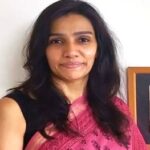 Priya Narayanan |
Priya Narayanan is a poet and children’s author based in Ahmedabad. She runs her own design practice under the twin banners Tatva and Soma and is Professor at CEPT University, her alma mater. When not practicing and teaching design, she likes to travel solo and read everything that comes her way. Brought up amidst the hustle and bustle of various cities, a part of her yearns for the elusive quiet and solitude of the countryside. Consequently, she falls back upon poetry for that sense of contentment and at times, closure. |
2nd Prize Winner Rashmi VeSa |
Rashmi VeSa, writes Japanese short forms of poetry and lives in Bengaluru, India with her family. A workaholic with an exciting day job, for a few moments daily, she retreats to an alternate, stress-free life in the world of words. Her work has appeared in many haiku journals and anthologies. |
3rd Prize Winner Dr Indra Neil Mekala |
Dr Indra Neil Mekala is a radiologist from the State of Andhra Pradesh. He loves reading and writing poetry especially haiku. His haiku have been published in various international journals and websites and also won awards in various international haiku competitions. |
Jury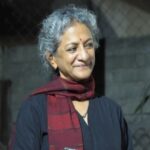 Kala Ramesh |
Kala is a Poet, an editor and anthologist based in Pune, India. According to her, haiku (a nature and season’s poetry) takes us closer to being observant and sensitive to our environment and enhances our need for self-expression — which is what literature is all about. She is a life-member of EFSLE. Kala’s initiatives culminated in founding ‘INhaiku' to bring Indian haiku poets under one umbrella in 2013. She has taught haiku and allied genres at Symbiosis International University and the Katha National Writers Workshop since 2013. To bring haiku into everyday spaces, Kala initiated HaikuWALL, haikuTRAIL, haikuTALK, haikuWORKSHOP, haikuYOUTH, haikuUTSAV, haikuDHYANA and haikuSTAGE – a weaving together of art forms. FOREST BATHING : SHINRIN-YOKU is a passion with her — for she feels urban residents should understand this beautiful concept. She is the editor of four haiku, tanka and haibun journals. Kala has been a speaker at several national and international literary festivals. Kala co-edited the award winning »‘Naad Anunaad: an Anthology of Contemporary World Haiku’ (Vishwakarma Publication 2016, Pune), »‘Wishbone Moon’ (Jacar Press 2018, USA) and » ‘EquiVerse SPACE’ (Notion Press 2018, Mumbai), co-authored with Marlene Mountain the e-book »‘one-line twos’ (Bones Journal 2016, Denmark), authored a tanka e-chapbook »‘Uunseen Arc’ (Snapshot Press 2017, UK) and two print books: »‘Haiku and the Companion Activity Book’ (Katha Books 2010, reprint 2017, New Delhi) and »‘Beyond the Horizon Beyond’ Haiku & Haibun (Vishwakarma Publication, 2017, Pune) |
Project Coordinator Rishikesh Kumar Singh |
Rishikesh is a poet, an ecocritic, a researcher, traveller, an environmentalist and Ecological Facilitator. He is the Founder President-cum-Director of EFSLE (Ecosophical Foundation for the Study of Literature and Environment). He is an English faculty as well as a Consultant Clinical Psychologist based in New Delhi, India. His research area has been broadly related to Ecocriticism and also he has completed two major research projects in this field. His latest research project on The Bhutanese and Sikkimese Women and their Ecocritical Concerns is in progress. His research articles and poems have been published in various international and national journals. He presented his poems in the SAARC Literary Festival 2010 and in various literary festivals in different countries like Thailand, Malaysia, Indonesia, Sri Lanka, Nepal and Bhutan. He is a polyglot and thus a translator too. He has translated the Earth Anthem into Bhojpuri Language. He has edited three books on criticism so far. He has an experience of translator for 5 years in the Ministry of Information & Broadcasting, Govt. of India. Rishikesh has been pulling out all the stops to promote and elevate the haiku art form across the globe. He is also a trained Counselor who practices in the field of Bibliotherapy especially connecting it to Ecology and its impact on Human Psyche. He facilitates the academia with his innovative teaching skill especially in the field of Applied Literature amalgamating Literature, Human Rights, Gender issues and Psychology together. Recently he initiated in the field of Neuroecoaesthetics, Ecosurrogacy, Bibliotherapy, Green and Blue Humanities, Geocriticism and Ecocriticism through the movement what he calls the LEGH Movement (Literature, Environment, Gender and Human Rights). |
EFSLE
Ecosophical Foundation for the Study of Literature and Environment (EFSLE) is a unique platform where all the ecocritics, environmentalists, social scientists, researchers, eco-poets, artists, activists and the one who cares for environment all merge. However, this is not ONLY the environment…it is comprised of Literature, Gender and Human Rights as well. So, this represents all the aspects of an individual’s life and also studies, analyses and interprets the factors, causes and consequences evolved in the course of time. This is LEGH (Literature, Environment, Gender and Human Rights) an amalgamation of varied cultures, histories, geographies, philosophies and ecologies. Yes, the soul is environment incorporating with others. LEGH is not simply an ideology rather it paves a way for creation, expression, revolution and rejuvenation…a viaduct between Nature and Humans. The EFSLE headquarters is in New Delhi. Its Executive Council is established in each state of India. Apart from that, EFSLE has also established its Executive Councils abroad, including eight countries.
